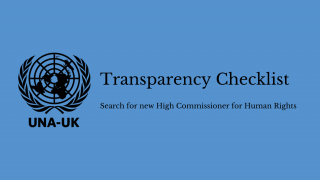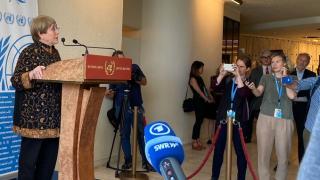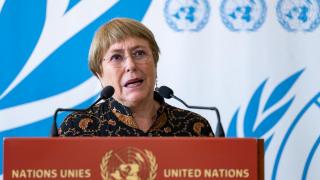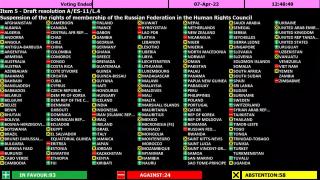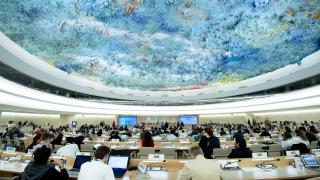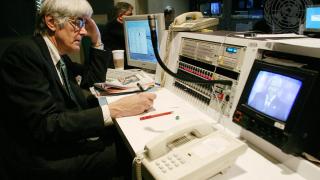
Edward Mortimer was one of UNA-UK’s closest advisors and a strong supporter of the organisation for more than two decades. As an organisation, and as staff members who knew Edward well, we were deeply saddened to learn of his death.
Following a prominent journalistic career, as a leader-writer at the Times then as the Financial Times’ chief foreign affairs commentator, Edward was recruited by UN Secretary-General Kofi Annan in 1998 as his chief speech writer. During the following eight years, five of which with the additional responsibility of Director of Communications, Edward transformed the way in which the UN communicated with the public. His formidable intellect, wit, mastery of language and close personal friendship with Annan helped him turn the Secretary-General’s quiet moral authority into a global voice for the oppressed.
Richard Amdur, Director of Communications at the United Nations and a former colleague of Edward’s, said:
Edward was part of a crew of lively minds surrounding the Secretary-General given license to think and experiment at a time when, still in the early years of the post-Cold-War period, the future of the United Nations was being written anew and was still full of hope.
Following his time at the UN, Edward continued to pursue his instinctive commitment to work for human rights and did so across a raft of issues, civil society organisations and initiatives. This included his role as Council Member of Minority Rights Group (1999-2007), Senior Vice-President and Chief Programme Officer of the Salzburg Global Seminar (2007–12) and his Chairmanship of the Sri Lanka Campaign for Peace and Justice (2010–15) and as a consultant to The Elders (2014-15).
Throughout this period and until the time of his death, UNA-UK was immensely privileged to count Edward as a close advisor both formally, though our policy group, and informally, as a frequent contributor to our events and publications - and a source of wisdom and mentor to staff.
Edward was always willing to open up his enviable address book of journalistic colleagues to help our campaigns reach a wider audience. In 2014 Edward not only ensured our then nascent 1 for 7 Billion campaign was well picked up in the media, but went on to lead an important strand of the campaign, encouraging international correspondents to take an interest in the Secretary-General selection process and scrutinise candidates for the position. The campaign got traction and the process gained a truly global audience.
In 2005-6, we worked with him to support Annan’s seminal “In Larger Freedom” report and to host Annan on his last visits to the UK as Secretary-General. Years later, to mark the release of “We the Peoples: A UN for the 21st century” - a collection of Kofi Annan speeches - we were delighted to host both of them at King’s College. The audience heard the two close friends reminisce about the UN’s work in the early 2000s and discuss how global governance needs to be reformed to serve future generations.
As President of BAFUNCS - the British Association of Former UN Civil Servants - Edward used the occasion of the UN’s 70th anniversary to work with the Bodleian Library in Oxford, UNA-UK and the Institute for Development Studies to organise a series of Witness Seminars bringing together experienced current and former UN diplomats. This culminated in the release of a major IDS report which captured an enormous body of wisdom for policy-makers, academics and future generations. Around this time he also lectured on the findings of his in-depth study “Freedom in Diversity: Ten Lessons for Public Policy” co-written with Timothy Garton Ash and Kerem Oktem.
In 2018, Edward used UNA-UK’s in-house magazine to speak about the foreign policy implications of Brexit, dismissing those who tried to frame the new era of “Global Britain” in triumphalist terms, stating: “This is fantasy, based on a highly selective view of British history and a willful disregard of changing global realities.”
Natalie Samarasinghe, CEO of UNA-UK, said:
Edward brought out the best in us, as he did everywhere he worked - urging us to take up unpopular causes and helping us to do so more effectively. On a personal level, there are few people who have had a more profound impact on my life.
Edward remained committed and active in initiatives to strengthen the UN until the end of his life. This spring we worked closely with Edward on a successful campaign for greater transparency and meritocracy in the appointment process for the new head of OCHA including an open letter to Boris Johnson signed by over 50 former diplomats.
He is survived by his wife, four children, and seven grandchildren and will be missed not just by his family and friends, but by generations of UN diplomats and internationalists who worked with him in the service of multilateralism, human rights and peace.
Personal Reflections
Natalie Samarasinghe, CEO, UNA-UK:
I am struggling to write about Edward Mortimer - our brilliant, loyal advisor, who moved so seamlessly from role model to mentor to confidant that I often left our meetings feeling baffled: how did I come to have a friend who was forty years my senior and a public intellectual to boot?
Edward embodied and defied such labels. The principled English gentleman that I’ve never otherwise encountered outside literature. The Oxford academic whose eccentricities were not ego-driven. The journalist who couldn’t bear to be a bystander.
How to do justice to a man whose words moved the world? How to tell stories about a master raconteur who could deploy bon mots in service of deep truths?
Much will be made about the powerful combination of his words delivered in the quiet, compelling voice of Kofi Annan. But he was so much more than a speechwriter.
He appealed to the best in all of us: gently pushing the UN to deal with the hardest of issues, to confront its own failings with humility, and to speak up for those who cannot. Even when Annan did not want to use the bully pulpit, Edward made sure the platform was not squandered.
He was our conscience too at UNA-UK, always urging us to take up a cause, and kind to a fault - responding to those who reached out for help, even against his better judgement. I’m glad that I listened to him for the most part, even if it did sometimes get us into trouble!
But I admired him most for his leadership of the Sri Lanka Campaign, which I supported for many years. On paper, he was Chair of the Board - and a very bad one in the traditional sense, stumbling through the agenda during endless dinner board meetings that I now miss terribly. Yet the campaign would not have existed without his willingness to act on an appeal to his conscience, and to lend his reputation, wisdom and address book to a cause he, by his own admission, knew little about.
Throughout, he was painfully aware of not being a white saviour, conscious of the need to be led by those on the ground, reluctant to put his name out there unless it served a purpose. He applied the same thoughtful approach at All Souls, in his soul-searching on its benefactor, the slave-owner Christopher Codrington. He is proof that age and upbringing are no bar to empathy. You can be woke while sporting a bow tie.
Above all, I am indebted to him for his friendship. Every conversation with him was invigorating. I would often have to ask him to explain some erudite reference - to a person, event, book or quote. This he would do, with great detail and gusto, before sitting back, genuinely interested in my views. And, invariably, he would ask: so what can we do? I will try my best to keep asking that question.
Richard Amdur, Director of Communications at the UN:
I vividly recall Edward’s arrival on the 38th floor in 1998 as Kofi Annan’s chief speechwriter – a jumble of gangly limbs, a tangle of unruly hair and, most of all, a torrent of words. It was with those words that he made his mark. A renowned columnist and skilled polemicist, he was also a brutal editor – brutally good, that is; back in the days before track changes, it was largely his red scrawl, almost scorching the pages, that made Kofi Annan’s speeches sing.
He was part of a crew of lively minds surrounding the Secretary-General given license to think and experiment at a time when, still in the early years of the post-Cold-War period, the future of the United Nations was being written anew and was still full of hope.
With his passing, certain images and moments come to mind: Edward hunched over the keyboard, working through an argument; Edward dropping himself into a chair, just minutes before the noon briefing on that awful 19 August 2003, to write a tribute to our colleagues murdered in Baghdad; Edward in his element at the head of a lunch or dinner table, unabashed about telling stories with punchlines in French – those of us not in on the joke were swept along anyway. Edward could fill a room, and he filled a key role with ideas and elan.
Those were exciting times and Edward was one of the main reasons why. He was warm, funny, incisive and loyal. He embraced the United Nations, jousted with the talking heads on television to defend us, and was utterly devoted to Kofi. To have his voice now silenced is a terrible loss, but his words set a standard then and will long endure.
Tina Micklethwait:
Edward Mortimer was both a dear friend and colleague. Working with him was a privilege and a pleasure, from the time when he was Kofi Annan’s Chief speechwriter to the years when he was Senior Vice President and Chief Programme Officer of the Salzburg Global Seminar, and, most recently, when I was a member of the Board of Trustees of the 21st Century Trust. Edward was our Chairman, until he died.
As a friend he was kind, loyal, supportive, and together with his wife Wiz, so understanding when my son’s life tragically ended.
Then there are so many happy memories, shared frustration when faced with bureaucratic obstacles or just plain bored! Edward could appear to doze off during a dull meeting, but when asked a question, would look up and give an articulate and appropriate answer.
When we worked together in Salzburg on the Seminar’s annual report, I would gather together the ingredients, as it were for a cake, and Edward would put the perfect icing on it. He was not only formidably clever but also eloquent, and he could always pull an elegantly phrased rabbit out of his magic hat. The speeches he wrote for Kofi had the same sublety, perfectly orchestrated to suit Kofi’s style and manner.
Edward’s relentless support of minorities, the marginalised, and victims of human rights abuses, included important contributions to these causes at the same time as holding down fulltime jobs. Somehow he managed to span an enormous range of activities, speaking engagements and media interviews, as well as fitting in family holidays.
In spite of his impeccable academic credentials – scholar at Eton and Oxford, Fellow of All Souls – Edward was not a snob. He greatly admired artists, actors, writers, musicians, filmmakers... no matter where they came from or went to school. He was in awe of their talent. His embrace of a wider world was what made Edward so special, along with his extraordinary memory.
Edward could be funny and frivolous. I remember enjoying jolly times with him and Wiz, often with some of their many friends. And I recall with great pleasure going with them to the Franziskanerkirche, a beautiful church in Salzburg where the regular Sunday service would be a complete Mozart, Haydn or Schubert Mass with chamber orchestra, choir and soloists. Afterwards we would have brunch at Demel... eggs in a glass was a particular favourite.
Edward’s intellectual contribution to the world goes without saying. His personal contribution to friends and colleagues, his empathy and encouragement, is something those of us who were the beneficiaries of his generous spirit will always cherish. We will miss him, but he leaves behind his beloved wife of more than 50 years, four wonderful children and seven grandchildren, along with so many powerful words and a lot of wisdom.
Read more
- Financial Times Obituary
- Times Obituary
- UN mourns the passing of Edward Mortimer
- UN Interview: Edward Mortimer urges more transparent process to select Secretary-General
- Watch the 2014 King’s College event, in conversation with Kofi Annan and Edward Mortimer, facilitated by Sir Jeremy Greenstock
- Read the obituary of Kofi Annan written by Edward Mortimer in 2018
- Watch the UN University interview: Saving More People from the Scourge of War? a Conversation with Mr Edward Mortimer
Photo: Edward Mortimer in 2004, then Head of Speechwriting Unit of Executive Office of the Secretary-General, monitors a recording of UNSG Kofi Annan. Credit: UN Photo/Stephenie Hollyman


